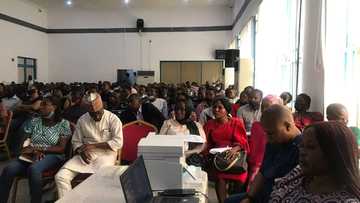Why the Economy Will Remember Emefiele With a Smile by Abdulkadir Kabiru
Editor's note: An economic analyst based in Kaduna state, Abdulkadir Kabiru, writes on the policies and actions of Godwin Emefiele, the current Central Bank of Nigeria governor, noting that they have enhanced the economic prosperity of Nigeria since the apex bank chief was appointed.
PAY ATTENTION: Click “See First” under the “Following” tab to see Legit.ng News on your Facebook News Feed!
Last week, the minister of humanitarian affairs, disaster management, and social development, Sadiya Farouq, inaugurated the NEXIT-CBN Agri-Business, Small and Medium Enterprise Scheme (AGSMEIS). AGSMEIS is an initiative of the Central Bank of Nigeria under its current governor, Godwin Emefiele, in collaboration with the Bankers’ Committee aimed at promoting agri-business and SMEs as a vehicle for sustainable economic development and job creation.

Source: Twitter
The AGSMEIS is one of many interventions the CBN is implementing to empower youths, create employment, diversify the economy, ensure food security and reduce the nation’s dependence on importation.
Recently, Emefiele reiterated the apex bank’s commitment to various economic interventions targeted at youth empowerment and job creation, as well as supporting small and medium scale enterprises when he launched the Tertiary Institutions Entrepreneurship Scheme (TIES), an intervention aimed at tackling underemployment and unemployment among Nigerian youths.
Emefiele said at the event.
Do you have a groundbreaking story you would like us to publish? Please reach us through info@corp.legit.ng!
“The scheme, developed in partnership with Nigerian polytechnics and universities, is designed to harness the potentials of graduate entrepreneurs by creating a paradigm shift from the pursuit of white-collar jobs to a culture of entrepreneurship for economic development and job creation.
“Bridging their financing gaps and enhancing access to low-cost credit to drive the development of business is a task that can only be addressed by an innovative financing model that correlates with the complexity and dynamics of these small businesses.”
The CBN had, in 2018, also developed a Creative Industry Financing Initiative (CIFI), in collaboration with the Bankers’ Committee, as part of efforts to boost job creation in Nigeria, particularly among the youths. The CIFI covers the fashion, information technology, movie, and music industries.
Indeed, the CBN under Emefiele, in the past eight years, has laid a solid foundation for a vibrant economy supported by macroeconomic stability. It is achieving this by looking inward and propping up the non-oil sector, which mainly comprises agriculture, manufacturing, and services.
For instance, under the Anchor Borrowers’ Programme (ABP), the CBN has financed 4.5 million farmers that cultivated 5.3 million hectares across 21 commodities through 23 Participating Financial Institutions in the 36 States of the federation and FCT. Before the ABP, Thailand alone exported 1.3 million metric tons of rice to Nigeria in 2014. Thanks to the ABP, Nigeria has witnessed incremental reductions in rice imports from Thailand.
By 2016, rice imports from Thailand had fallen to only 58,000 metric tons. By 2021, they only exported 2,160 metric tons to Nigeria, thereby saving the country foreign exchange and helping preserve jobs in Nigeria. The unprecedented rice pyramid witnessed in Abuja recently, and the over 160 percent rise in the number of rice mills in the country are also evidence that the CBN’s intervention in the agriculture sector is yielding fruits.
Before now, there had been lending apathy by banks towards small farmers and micro, small, and medium enterprises. However, through the Bankers’ Committee, Emefiele has been able to set up a special fund that led to the establishment of the NIRSAL Microfinance Bank with a specific mandate to implement the Agribusiness, Small, and Medium Enterprises Investment Scheme.
It is refreshing to observe that Emefiele and the apex bank he superintends are proving pessimists wrong by being focused on leveraging on the developmental component of his mandate as the proactive tool to support the real economy – agriculture, manufacturing, and services – which are the elastic sectors of the economy for enhanced economic growth and development.
Disclaimer: The views and opinions expressed here are those of the author and do not necessarily reflect the official policy or position of Legit.ng.
Your own opinion articles are welcome at info@corp.legit.ng— drop an email telling us what you want to write about and why. More details in Legit.ng’s step-by-step guide for guest contributors.
Contact us if you have any feedback, suggestions, complaints, or compliments.
Source: Legit.ng





